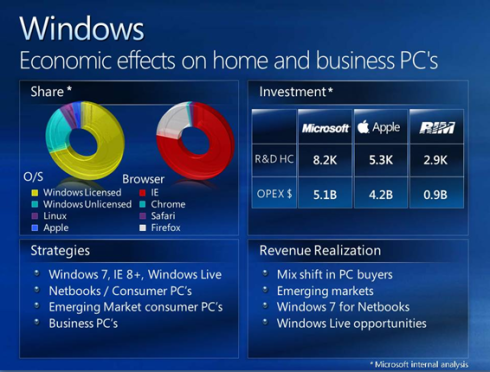11.20.10
Posted in GNU/Linux, Microsoft, Novell, OpenSUSE, Ubuntu at 4:15 pm by Dr. Roy Schestowitz

Summary: Status of OpenSUSE as seen from the past two weeks’ news
FEDORA 14 was a successful release that I’ve installed on several PCs. Ubuntu is still very widely deployed, but Fedora has just passed Ubuntu in DistroWatch.
Back in 2006 it was a different story. Almost every PC I set up would have SUSE on it. That was before Novell’s deal with Microsoft. Many people can tell (and do sometimes tell) a similar story. Going back to 2006, OpenSUSE was in a good position to be what Ubuntu is today. It was ahead with Compiz, it was polished, it had YaST, and it enjoyed advertising from Novell, which Novell almost stopped entirely over the years, especially after it became Microsoft’s friend and abstained from saying anything negative about Windows. Novell even took down its Web pages that were critical of Windows/Microsoft, as we showed back in late 2006.
So, where does that leave OpenSUSE? Even members of OpenSUSE do not appear to be sure. They just keep chatting about strategy, hoping to figure out how to revive the project. They tried to set up a “boosters” team, but that too is failing because Löffler is one among many who leave and journalists do notice. One of the best GNU/Linux-oriented journalists, Richard Hillesley, has just given his famous “Health Check” to OpenSUSE and he too — like us — suggests seeking independence from Novell. From his concluding words:
Much more intriguing is the prospective establishment of an openSUSE foundation during 2011, and the much rumoured sale of Novell, which may result in a new era of independence and freedom for SuSE, and new horizons for openSUSE and its developers.
OpenSUSE is a Novell trademark, so the project would have to choose a new name, which can harm brand recognition.
Going further back to the beginning of the month, this one person asked in the headline: “Is it me or is there a lack of interest in openSUSE?”
Is it me or is there a lack of interest in openSUSE?
Whether its browsing the internet and looking for information about openSUSE or talking to the general public, openSUSE just seems to not get the attention I believe it deserves.
It isn’t a bad operating system but struggles to gain popularity, is that still because of the Microsoft deal a few years ago?
SUSE has never been the same since that deal. Last year OpenSUSE decided to release less often and even at decreased pace there are delays that Will Stephenson addresses with this very recent announcement. There seems to be nothing that can give OpenSUSE its old momentum back. Even its community leader left, only to be replaced by Jos Poortvliet who hangs out in south America at the moment [1, 2, 3] (he’s probably back by now).
It would not be fair to say that OpenSUSE is just history because HP still offers SUSE as an option on this netbook. From the news:
HP has released a budget-priced netbook for business users, offered with mobile broadband and GPS options. The $300 Mini 1103 runs SuSE Linux or Windows 7 on a 1.66GHz Atom N455 processor or 1.83GHz N475, comes with 160GB or 320GB hard disk drives, and has the usual 10.1-inch screen with 1024 x 768 pixels, the company says.
There are still new releases of OBS (in addition to other parts [1, 2] and HOWTO activity [1, 2]) and a person who is usually quite hostile towards GNU/Linux intends to give OpenSUSE a go:
I think I’ll swap in a different hard drive this weekend and try a clean install of Kubuntu or openSUSE. But if I can’t get better performance, I’m going to have to conclude that this laptop is just not up to KDE’s resource requirements. I could go the other direction and install a really lightweight desktop like LXDE, but I like the desktop effects. I know, it’s shallow, but I do.
Steven J. Vaughan-Nichols, a longtime SUSE fan, reviewed the latest stable release and a British site has just made a copy of his review, which is mostly positive.
While Novell sells its commercial SUSE Linux to business users, the free open-source software version of openSUSE is still freely available, with openSUSE 11.3 majoring on its KDE 4.4 desktop interface
We’ve been using SUSE Linux since its start in 1994 and then, as now, we like this strong desktop Linux distribution. Of course the latest version, openSUSE 11.3, doesn’t look a lot like that vintage Slackware variant, but one thing has remained the same. Today’s OpenSUSE is a Linux for users, not developers or Linux technicians.
[...]
All in all, we’ve found that openSUSE 11.3 is, once more, a great Linux distribution. While we know free-software purists won’t care for its use of Mono and parent company Novell’s friendly relations with Microsoft, if you can past that, you’ll find a truly excellent Linux desktop.
Sascha Manns, who still has those weekly news coming, speaks about OpenSUSE Medical [via] and says: “Some month our team was busy, and so you hasn’t heard about us. But we are alive. We are pleased to announce our new openSUSE Distribution who still medical needs.”
OpenSUSE is far from dead, but still, overall, OpenSUSE will never be a top distribution unless it disconnects from Novell and does something amazing. Microsoft crushed Novell, which is now waiting for good buyers. More on that in a later post. █
Permalink
 Send this to a friend
Send this to a friend
Posted in FUD, GNU/Linux at 1:53 pm by Dr. Roy Schestowitz

What Microsoft says
Summary: Figures suggest that GNU/Linux users are more common than suggested by flawed statistics (gathered by flawed methods with clear data bias)
THE FORMER EDITOR of Microsoft Watch does not want to believe it, but the poll speaks for itself (not providing an accurate measure but a mere data point):
Twenty five percent. Well, 25.82 percent to be exact, so closer to 26. That’s the number of respondents claiming to be Linux PC users in my poll: “How would you identify yourself as a computer user?” The number is seemingly credible: 2,014 votes from 94 countries — 988 from the United States. There are 1,858 unique IP addresses, which along with cookies blocking repeat votes suggests the results are largely clean of Linux enthusiasts stuffing the ballot box, so to speak. Something else: After the poll reached the 25 percent Linux PC threshold, it stayed there even as votes accumulated — that’s another indicator the results are good. But I don’t believe them, certainly not that only 60 percent of respondents are Windows PC users.
The word “belief” or “believe” often implies faith over science (he also uses this word in the headline). Over at Microsoft Watch, back when he was its sole editor there were more comments from GNU/Linux users than from Windows users, says Tim from OpenBytes. It became somewhat of an embarrassment for a site called Microsoft Watch and we talked about it last week in an episode of TechBytes. Here is our Wiki page about market share. █
Permalink
 Send this to a friend
Send this to a friend
Posted in Free/Libre Software, Patents, Red Hat at 10:23 am by Dr. Roy Schestowitz

Summary: A grouping of patent news regarding software
OVER THE past couple of years we have given several examples of well-known venture capitalists who openly oppose software patents. Now there is a new article titled “tech investors call for patent reform” and it says:
A number of heavyweight venture capitalists in the tech hubs of Silicon Valley and New York are calling for serious patent reform in Washington.
Though patents were created to encourage innovation, a growing number of investors say the patent system actually stifles it. In the fast-moving software market, where online applications are constantly changing, investors say software patents are often targets for lawsuits rather than protection from them.
We keep hearing a bunch of propaganda stories from the software patents lobbyists. One line of propaganda is that any small company may need to earn a monopoly from the USPTO before it can attract investments. Richard Stallman did a good job explaining why it's a fallacy. Unless the small company is a patent troll, it cannot really win patent cases against large companies, which can retaliate against the small company’s product/s using a massive portfolio of patents (it can also buy more patents to do so).
Red Hat is an example of how a medium-sized company can get injured by a patent troll, Acacia. Patrick Anderson, a pro-patents person who wrote about the case a few times, has just written the post “Smart Red Hat Employees”. In it he explains who in Red Hat successfully gets the message across to patents-oriented people:
Sure, I may have had a little fun with Red Hat here, and joined a little criticism of the company here and here. But at the end of the day, the company does have some pretty sharp guys working for it. Last year, I mentioned one of them: Jan Wildeboer (referring to him as “clearly the most intelligent” participant in an anti-”software patent”* video created by Red Hat). Today, I learned about Travis Kepley. Travis posted a comment that I found far more interesting than the article itself. Speaking on the education of judges and juries about open source software, Travis notes a certain frustration derived from a bias created by large, proprietary software vendors
it can only be hoped that those who profit from patents (commonly lawyers) will come to realise that their propaganda about venture capitalists is bunk and that software patents do not increase progress, they only limit progress. They are an impediment essentially.
Our loyal reader Satipera says that the “ITC invalidates software patents” which is news that the USPTO might not fancy all that much:
The ITC has confirmed in its final determination that MVTec does not infringe the patents asserted by Cognex and that those patents are invalid – meaning MVTec’s machine vision software HALCON will continue to be sold and imported into the USA.
What prevents the ITC from invalidating many more patents? Could the ITC, whose main bureaucratic function is to impose embargo/sanction on imports, turn out to be the opportunity for change? It recently dealt a blow to Apple. The ITC stands for “International Trade Commission”, but it’s not international, it’s created and operated by the United States. Anderson writes another new post in his blog, this time about spam filtering in erotic and pornographic companies too. These companies are accused of infringing software patents:
Indeed, the case involves a patent infringement complaint against 30 companies, including several with more “colorful” histories, including Larry Flynt Publications, Bang Productions, Vivid Entertainment, Playboy Enterprises, Hustler Video and Penthouse Digital. The technology involves organizing video files with tags, so there are a few non-pornographic media companies thrown in for good measure, like Disney, Time Warner,Lions Gate and (of course) 20th Century Fox.
Anderson generally concentrates on gaming software patents and here is news related to that: “IGT files patent infringement lawsuit against Aristocrat”
In the lawsuit, filed in U.S. District Court in California, IGT claimed Aristocrat infringed on two gaming software patents.
Even leisure time is badly affected by bad patents. What good might these patents ever bring? Here are a couple of new press releases about software patents in general:
i. EDSA Awarded Five New Patents for Real-Time Power Systems Monitoring and Predictive Analysis Technology; Includes New Foundational Patent
ii. Patent Calls Hosts First Patent Expert Witness Boot Camp
Technology-based patent analysis services and software solutions provider Patent Calls today announced its collaboration with Dr. Tom Rhyne for an exclusive limited enrollment Patent Expert Witness Boot Camp to be held at the Lakeway Resort near Austin, Texas in February 2011.
That’s where a lot of the patent trolls roam. █
Permalink
 Send this to a friend
Send this to a friend
Posted in GNU/Linux, Google, Microsoft, Patents at 9:59 am by Dr. Roy Schestowitz

Summary: Microsoft’s ongoing coup against the Linux-based Android and another lawsuit against Microsoft’s competitors in mobile phones
EARLIER this week HTC decided to turn its Android into Ballnux by paying Microsoft for untold patents which Microsoft claims are infringed by Linux. Microsoft already extorted other Android phone makers in more or less the same way, apparently getting a patent deal without even much of a fight with Samsung and LG back in 2007. The mobbyists seem delighted to find Android makers being sued by a company called Vertical Computer Systems, which Microsoft paid in 2008 (for a settlement). The interesting about it can be found in the comments, including one that says: “Odd Microsoft private settlement in a patent infringement lawsuit filed last year by Vertical Computer Systems did not need a judge or a jury. MSFT and VCSY agreed to a private settlement so we will never know but I personally doubt 1.9 billion was the number. Is IBM, Adobe, Yahoo, Google and GE their next legal stop? Or will this Microsoft settlement be enough to bring future nonexclusive licensing without heading to the courthouse? Only time will tell if vertical goes vertical because of their licensing agreements or the legal agreements.”
The settlement was over .NET, which was also sued months ago. The mobbyists are promoting .NET/Mono while also slurring Groklaw, so someone should give a clue to OMG!Ubuntu!, which still promotes Mono [1, 2, 3, 4]. To give examples that are new, there’s Do, Docky, and Banshee. OMG!Ubuntu! is quite foolishly promoting Mono-based software without warning about Mono as an ingredient (it’s a patent problem according to the FSF).
Well, Microsoft also paid Acacia under circumstances which involved no legal challenges. Either way, another new case is St. Clair Intellectual Monopolies Consultants, which sues Apple Inc., HTC Corp., and Research In Motion. Bloomberg says:
Apple Inc., maker of the iPhone and iPad, along with rivals HTC Corp. and Research In Motion Ltd., was sued by patent holder St. Clair Intellectual Property Consultants for alleged infringement of six U.S. patents for computer-function management.
[...]
Microsoft Corp., the world’s largest software maker, sued St. Clair in April in the same court, seeking a ruling that it doesn’t infringe four patents for computer-power management. That case is continuing.
Due to a deal with Verizon [1, 2, 3, 4], Microsoft not only gets to make money when Android phones are sold (patent extortion deals) but Microsoft also gets to push Microsoft’s Bong [sic] into Android phones and here is the latest example:
There’s yet another new Google Android phone on its way to Verizon Wireless with Microsoft’s Bing search engine pre-installed.
Microsoft cannot get people to choose its services, so it reportedly paid Verizon half a billion dollars to shove its services down customers’ throats (it’s virtually impossible to change, by design). Later on, having extorted companies and removed choice, Microsoft still wonders why there is so-called ‘hatred’ [1, 2, 3] against it. █
Permalink
 Send this to a friend
Send this to a friend
Posted in Patents at 8:46 am by Dr. Roy Schestowitz

Summary: Karel de Gucht (shown above) and the USPTO carry on with their race for ACTA, which is an enemy of software freedom as well as many other freedoms
LAST WEEK we mentioned Karel de Gucht, the European Commissioner for Trade, who argues falsely that ACTA won’t harm free software. This man turned into another foe of Europe’s interests by choosing to push the US initiative known as ACTA (which is unconstitutional). Its purpose is to help mega-corporations gain even more power over society all across the world. Karel’s slip of the tongue has just caused TechDirt to state that:
As US Insists ACTA Is Not A Treaty, EU Trade Commissioner Admits It’s A Treaty
We’ve already posted about David Kappos’ non-response to legality questions about ACTA, but at the bottom of KEI’s coverage of this story there’s another interesting point. ACTA supporters in the US have been bending over backwards to insist that ACTA is not a treaty. Any time anyone mentions it as a treaty in the comments here, one of the ACTA supporters among our readership will quickly admonish them for being clueless about the law and will insist that this is nothing more than an “executive agreement,” which does not need Senate approval. It’s one of ACTA supporters’ favorite talking points. Of course, there are some serious constitutional questions about that.
However, much more telling is that many ACTA supporters will outright admit it’s a treaty. We already noted that the Business Software Alliance (BSA) did just that a few weeks ago (and also falsely claimed it had already been signed by 37 countries).
Hello, Kappos? Et tu, BSA?

Notice the role played by the USPTO there. Kappos is of no use because of his views on the status quo. Credit must go to the brilliant Bernard Sanders, whose actions are noted by KEI right now:
Non-responsive letter from David Kappos of USPTO to Senators Sanders and Brown regarding ACTA consistency with US law
In a October 19, 2010, Senators Bernard Sanders (I-VT) and Sherrod Brown (D-OH) wrote to David Kappos, the Director of the USPTO, asking for an assessment of conflicts between the October 2010 ACTA text, and U.S. law. (attached here).
KEI also has this new paper [PDF] titled “Innovation Inducement Prizes to Reduce Costs, Enhance Productivity, and Expand Access”. It’s from two days ago and the target is Europe. KEI — like us — wishes to help Americans. But what’s good for American conglomerates, for example, is not necessarily good for citizens of the United States. Let’s expose the hawks (not eagles) of society and expose their malicious, self-serving agenda which USPTO helps perpetuate. The USPTO — like lobbyists — is there to serve counterproductive lawyers and massive corporations, so the “US” in “USPTO” can be as deceiving as the “NZ” in “NZICT” (it lobbies for the interests which are opposite to New Zealand's). █

Permalink
 Send this to a friend
Send this to a friend
Posted in Courtroom at 7:27 am by Dr. Roy Schestowitz

Summary: In his censorship rampage, Wayne Crookes tries to make the linking to articles he does not agree with grounds for defamation
“I didn’t know if you’d heard about this Canadian law suit,” wrote to us one member of Techrights. “I couldn’t remember reading anything about it on Techrights. Anyway, it seems serious, so I thought I’d send it, just in case…maybe a mention of this law suit on Techrights will get more folks to help out.
“Here’s the link and an excerpt from the p2pnet article:
…The scales of justice aren’t balanced by what’s right and fair. They’re balanced by how much money a given party can drop onto them. And I don’t have enough money to get there and back.
I’m not exaggerating when I say the case is the most important in the history of the internet in Canada because if Crookes wins, there won’t be an internet in Canada.
“We’ve pointed in the past to some rather ridiculous situations in Canada concerning libel law”, said Mike Masnick on TechDirt, recently, going on >>>
One key case involved a guy named Wayne Crookes, who not only sued major internet sites like Google, Yahoo, Wikipedia and MySpace for hosting content he believed to be defamatory towards himself, but he also sued Jon Newton of the site P2Pnet.net for merely linking to the content Crookes believed to be defamatory. A court in Canada eventually ruled that merely linking to potentially defamatory material is not defamation, and an appeals court agreed. Last I heard, the case had moved up to the Canadian Supreme Court.
Mike Masnick (TechDirt) and myself (Techrights) received similar threats, so this is relevant to us. More formal details can be found here. Do not let bullying and crooks silence or impede speech. We gave an example earlier today. █
Permalink
 Send this to a friend
Send this to a friend
Posted in Deception, Hardware, Marketing, Microsoft at 7:11 am by Dr. Roy Schestowitz

Summary: Despite spendings of close to a billion dollars in just marketing of Vista Phony 7 [sic] and KINect, Microsoft cannot really sell those gadgets in sufficient quantities
MICROSOFT IS BECOMING a successful incubator of patent trolls while its software business is declining (Microsoft fakes reports to hide problems including debt) and its attempts to reinvent itself on the Web cost around $3 billion in losses every single year.
Another area where Microsoft was never truly successful is hardware. Microsoft tried to sell its phone called the “KIN” and it was a disaster of unprecedented proportions. Then, Microsoft tried throwing an advertising budget at the problem, just heavily marketing Vista Phony 7 [sic]. We’re looking at the expense of about half a billion dollars. That’s an insane amount to spend on deceiving the public, almost like spending $1.5 for each US citizen to become aware of a platform with 0.00% market share. Some say that “KIN” is still around, not just in its Vista Phony 7 [sic] incarnation (the story of both shows a similar trajectory). As OpenBytes put it two days ago:
People often say when talking about Microsoft products “same old, same old” is there really anything new happening with WP7 and is it any surprise that its rumored to have only sold around 40,000 units? You decide.
For me Microsoft and its “mobile solutions” won’t be fooling me again and Im already on record saying that I believe WP7 will flop.
“Embarrassed to recommend Microsoft software” is the title of this new post which helps explain Microsoft’s status crisis. Its brand suffers a lot after products like “KIN” and Vista Phony 7 [sic] will do it no favours.
In summary, I’m not impressed at all with offline files. Especially when I compare it to solutions like rsync in Linux, which works perfectly every time, and works very very well. Why can’t Microsoft learn from previous mistakes, and fix their software? It’s embarrasing to recommend these products and sell the idea of using Microsoft software to somebody, when it will work for a while then break all of a sudden out of the blue. I should have learned, that it’s OK to recommend Microsoft software if absolutely necessary, but I no longer guarantee that it will work as designed.
Here is another take on Vista Phony 7 [sic], which starts receiving some bad press now that the huge marketing budget (means of softly bribing journalists/publications via PR agencies) dries up.
Microsoft released Windows Phone 7 in the US market recently. Despite massive advertising budget thrown at the new operating system release, there was no great over night, iPhone-like queue snaking around the block, which the Microsoft management so desperately needed.
The hyped release failed to generate the required buzz and the turnout wasn’t so flash. Add to this, there have been some decidedly unenthusiastic reviews for the devices in publications.
Techrights was apparently correct when predicting that Vista Phony 7 [sic] would fail just like “KIN” (although unlike “KIN”, Vista Phony 7 [sic] is just the platform, which is based on a dying project, Silverlight), but the huge Vista Phony 7 [sic] marketing expenses should assure more sales, not to mention giveaways to staff. It’s a short-term boost.
Another hardware product which is not doing so well so far is KINect. We’ll explain why the short-term boost is disappointing.
First of all, our reader Will shares this story about prerequisites which Microsoft understates. The devices is unsuitable for many homes and there have been reports of people breaking their belongings due to KINect.
Xbox Japan’s Kinect displays have 0.9 meter (2.9 feet) paper measure for gamers to take home and suss out their gaming quarters. 2.9 feet? Kinect needs around 8 feet to hit the sweetspot of certain games.
“I found this link kinda funny,” wrote Will in IRC. “The gist of my article is that Japanese Kinect displays have a paper tape measure to help people determine if they have enough space in their homes for the Kinect to work properly. The catch is, the paper measure is only 2.9 feet long, but the Kinect reportedly requires at least 8 feet.”
“The gist of my article is that Japanese Kinect displays have a paper tape measure to help people determine if they have enough space in their homes for the Kinect to work properly. The catch is, the paper measure is only 2.9 feet long, but the Kinect reportedly requires at least 8 feet.”
–WillPersonally, I have not been keeping up to date with KINect for about a month (TechBytes takes up a lot of time), but the number of sales quoted by Will helped me deduce that it’s failing to sell well. It’s only a month away from Christmas and a very small proportion of Xbox 360 owners bought a KINect in the first week and a half. Only 2-3% of people who bought Xbox 360 bothered getting such an overprices remote in the first 10 days after a massive marketing campaign estimated to have cost close to half a billion dollars. It’s the type of product which Nintendo just gives away with its console (although it’s not exactly the same type of peripheral).
People would be wise to avoid KINect for other reasons, for instance the spy factor which we wrote about some days ago. “Big Xbox is watching you” is a new article worth reading:
But if your hardware has facial recognition, then it could in theory recognize not just faces, but facial expressions. Imagine a world where your TV watches your face to see how you respond emotionally to the content it’s showing you. And reports on it.
Microsoft only pretends to respect people’s privacy [1, 2, 3]. It’s one of the most intrusive companies, usually for marketing reasons. Nintendo has only little or no interest at all in such personal data. █
Permalink
 Send this to a friend
Send this to a friend
« Previous entries Next Page » Next Page »


























 Content is available under CC-BY-SA
Content is available under CC-BY-SA